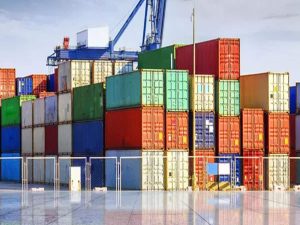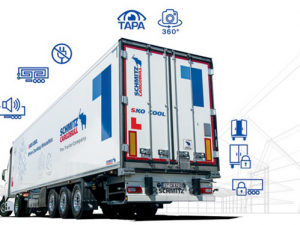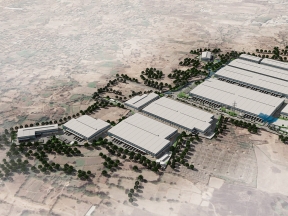Afzal Malbarwala, Managing Director, Galaxy Freight, said, “The air cargo volumes have rebounded so much that India’s air cargo market is now being seen as one of the most lucrative bets for freighter operators and other stakeholders across the world. As far as road infra is concerned, India is conquering its own limitations with expressways and highways cutting down transport time drastically and improving connectivity with ports and airports. Union Minister for Road Transport Nitin Gadkari recently said within two years, India’s road infra will be comparable to that of the USA. The minister highlighted the DFC is an effort to increase the share of rail freight and leverage the third most efficient rail network in the world to lower logistics cost to single digits.”
Read More »‘Logistics sector is moving from traditional models to integrated, tech-enabled supply chains’
Huned Gandhi, MD, Air & Sea Logistics, Indian Subcontinent, Dachser India said, “India’s cargo and logistics sector continues to show strong momentum in 2025, supported by robust domestic demand, expanding manufacturing and increasing export activity. Government initiatives such as the Gati Shakti Master Plan and the National Logistics Policy are playing a key role in upgrading infrastructure and driving digitisation across the supply chain. While Southeast Asian countries often benefit from regional trade agreements and port efficiency, India stands out for its large consumption-driven economy, multimodal infrastructure push and evolving regulatory environment. The market is moving steadily from traditional logistics models to integrated, technology-enabled supply chains. This shift is also reflected in the growing demand for contract logistics and value-added services.”
Read More »‘India offers sizeable unified market, growing manufacturing under Make in India & PLI’
Prediman Koul, CEO, Jeena & Company said, “We have an appealing cargo and logistics market owing to the high domestic demand, strategic location and steadily improving infrastructure development. We have focused heavily on improving our logistics ecosystem and government initiatives such as the National Logistics Policy, PM Gati Shakti Master Plan, etc, helping in increasing the efficiency and sustainability of the sector in the long run. If we were to compare India with Southeast Asian nations, we offer a sizeable unified market, growing manufacturing under the Make in India and PLI schemes, and rising consumption. These factors position India not just as a logistics hub for domestic needs but as a compelling gateway for global trade, making it a long-term strategic choice for global supply chain diversification.”
Read More »‘Infra enhancement & regulatory simplification crucial to unlock India’s competitive advantage’
Arun Kumar, President, AMTOI said, “While it’s important to recognise that each region has its unique strengths shaped by geography, history and economic evolution, drawing direct comparisons can often overlook context. India’s cargo and logistics market, despite being underappreciated historically, holds tremendous untapped potential. In recent years, the sector has gained much-needed visibility and attention from policymakers, with initiatives like the National Logistics Policy and PM Gati Shakti showing promise. However, to fully unlock India’s competitive advantage, far more needs to be done, from infrastructure enhancement and regulatory simplification to seamless multimodal integration and digitisation. In comparison, Southeast Asian nations offer strong competition. China has built one of the world’s most efficient logistics networks over the last two decades. City-states like Singapore and Hong Kong thrive on logistics as a core economic activity. Countries like Malaysia, Vietnam and Thailand have modelled themselves on their successful neighbours, creating efficient and export-oriented logistics systems.”
Read More »Streamline customs via ‘single window’ systems to enhance efficiency
Dilip Sahu, Director, EPS Worldwide Integrated Logistics said, “Next-generation cargo infrastructure requires a blend of regulatory reform, digital integration and public-private investment. Governments should streamline customs through ‘single window’ systems, harmonise trade documentation and mandate interoperable data standards to ensure seamless cargo visibility. Sustainability must be central, with incentives for zero-emission fleets, carbon accounting and green freight corridors supported by charging and refueling infrastructure. Public-private partnerships are critical for modernising ports, airports and inland hubs with automation, digital twins and AI-driven logistics planning, while also building multimodal freight corridors to reduce last-mile inefficiencies. National cargo data platforms, blockchain-enabled smart contracts and predictive analytics can enhance resilience and efficiency. Equally important are reskilling programs to prepare the workforce for automation and digital tools, alongside policy ‘sandboxes that enable testing of drones and autonomous vehicles. Ultimately, cargo modernisation depends on aligning private innovation with public policy to build sustainable, resilient and interconnected supply chains.
Read More »India’s express logistics sector to grow $18-22 bn by FY30: KPMG
According to the latest report by KPMG, with continued policy support and innovation, India’s express logistics industry is well-positioned to become a global leader and is projected to grow to $18-22 billion by fiscal 2029-30 (FY30), creating 6.5-7.5 million jobs. To sustain this momentum, stakeholders must focus on five pillars: agility, efficiency, customer centricity, sustainability and a robust regulatory framework. The sector has emerged as a critical enabler of economic growth, digital commerce and employment generation. Valued at approximately $9 billion in FY25, the sector has witnessed a robust compounded annual growth rate (CAGR) of 12-15 per cent since FY17, driven by the exponential rise in e-commerce, exports by micro, small and medium enterprises (MSMEs) and digital transformation. The express logistics market in India spans a wide range of services including cargo handling, multi-modal transportation, warehousing, last-mile delivery and customs clearance, making it a vital component of the country’s supply chain ecosystem, the report stated. The sector is a significant contributor to public revenue, with an estimated $1-1.5 billion in gods and services tax collections and $650 million in customs duties in FY24. It also supports 2.8-3 million jobs, both directly and indirectly, across urban and rural India.
Read More »Lufthansa Cargo, Shein ink pact to drive sustainable air cargo ops
Lufthansa Cargo and Shein have signed MoU to explore a range of initiatives to drive the adoption of sustainable solutions for airfreight. The initiative is aligned with the e-commerce platform’s commitment to addressing its carbon footprint from transportation. As part of this initiative, Lufthansa Cargo will provide high-quality ‘Proof of Sustainability’ certificates for the used SAF quantities. These certificates are based on externally verified standards and document emission reductions, compared to conventional jet fuel, in a traceable manner. SAF use and fleet efficiency measures and process quality form the basis of this collaboration. “Signing this memorandum with Shein represents Lufthansa Cargo´s commitment to implementing high-performance logistics solutions responsibly and with operational excellence. It demonstrates the importance of concrete measures and reliable implementation in the international air freight business. Together with all stakeholders within the supply chain, we are driving the development of more sustainable global supply chains in line with our purpose: Enabling Global Business,” said Lufthansa Cargo’s CEO Ashwin Bhat.
Read More »Schmitz Cargobull expands its cold chain capabilities in India
Schmitz Cargobull AG has announced a strategic investment in Sub Zero Insulation Technologies (SZIT) and plans to strengthen its presence in the rapidly growing Indian cold chain logistics market. Under the agreement, Schmitz Cargobull will acquire a 27.5 per cent equity stake in SZIT, with an option to increase its shareholding over the coming years. This partnership marks a significant milestone in Schmitz Cargobull’s global expansion strategy. “India’s cold chain sector is evolving rapidly and Sub Zero has demonstrated strong potential to lead this transformation. By combining Schmitz Cargobull’s engineering expertise with Sub Zero’s market reach, we aim to deliver high-quality, efficient transport solutions across India and beyond. This is not just about business growth; it’s about enabling infrastructure that can help reduce the 30–40 per cent of perishable produce lost annually due to inadequate cold-chain facilities – losses that also contribute significantly to greenhouse gas emissions” said Andreas Schmitz, CEO Schmitz Cargobull AG.
Read More »Allcargo unveils Grade A warehousing facility near Bengaluru
Allcargo Logistics has launched Grade A built-to-suit (BTS) warehousing facility for a Swedish player in the electrification business at Alur, Nelamangala near Bengaluru, Karnataka under Allcargo Supply Chain Private Limited (ASCPL). Spread over 1.5 Lakh sq. ft. the tech-enabled BTS facility will manage handling, storage and distribution of the company’s electrical components. The Alur warehouse will be the Swedish major’s largest in India and will serve as a consolidated distribution centre for its electrical component division. Its strategic location offers superior shipment connectivity, further enhancing operational efficiency. The warehouse is equipped with multi-tier shelving rack, heavy duty racking with product suitable elevation, on-floor storage location, maximising storage capacity. Reach truck, VRC, Spiral Conveyor, Double Deep Battery Operated Pallet Truck (BOPT) design, Customise Single Fork HPT ensure swift and smooth goods movement and handling. The Alur warehouse leverages SAP System and has deployed advanced scanning systems ensuring better functional efficiency. In addition, the facility complies with all the safety norms in terms of firefighting equipment, internal and external hydrant lines, internal sprinkler system, etc. The structure is energy efficient with natural light
Read More »WOLP expands warehousing footprint in South India, acquires land
Welspun One Logistics Parks (WOLP) has announced the acquisition of 51 acres of land parcel in Hoskote and 56 acres of land in Devanahalli. With these acquisitions Welspun has further strengthened its presence in South India reflecting its confidence in the long-term fundamentals of the region. The two new projects mark a significant expansion of Welspun One’s pan-South India footprint, taking its regional land bank to 260+ acres across Karnataka and Tamil Nadu. This portfolio represents a development potential of 6 million+ sq. ft., supported by a committed investment of $250 million (INR 2,150 crore). The company’s strategy has focused on early entry into high-potential logistics corridors, long before they become mainstream, evident in its pioneering moves across North Chennai and Bengaluru’s Bagalur, and now Devanahalli and Hoskote. These acquisitions will enhance Welspun One’s warehousing capabilities, creating scalable hubs to serve diverse occupiers across multiple industries. In East Bengaluru’s Hoskote cluster, Welspun One has acquired 51 acres for its Proxima category park, a Grade-A warehousing facility built to serve 3PLs, FMCG, and retail players. The micro-market already hosts major occupiers like Amazon, Flipkart, and DHL, and is poised for exponential growth with the upcoming Satellite Town Ring Road (STRR) and Bengaluru-Chennai Expressway within close reach. With excellent connectivity to SH-95, NH-75, and proximity to Whitefield, KR Puram, Sarjapur, and Varthur, the site offers quick access to high-consumption zones in East Bengaluru. The Hoskote-Soukya cluster currently houses over 7 million sq. ft. of Grade-A warehousing stock, with an estimated shortfall of 1.6 million sq. ft. by FY26–27, indicating sustained occupier demand.
Read More » Cargo Breaking News
Cargo Breaking News









